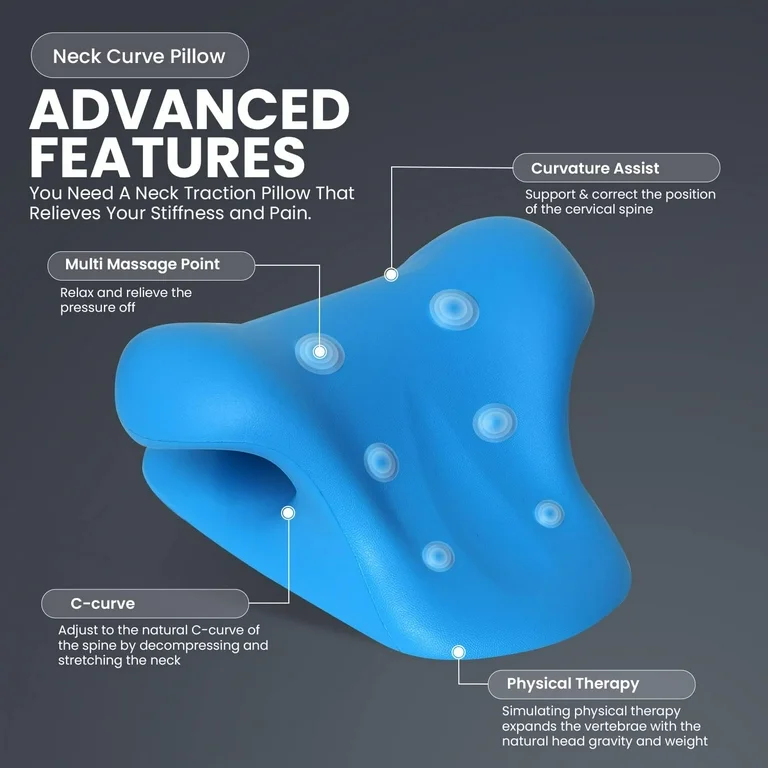Exactly How the Neck Cloud Can Assist With Persistent Neck Pain and Tightness
Exactly How the Neck Cloud Can Assist With Persistent Neck Pain and Tightness
Blog Article
The Influence of Anxiety on Neck Discomfort: Methods for Decreasing Tension and Pain
In today's busy globe, it's no key that tension has ended up being a widespread variable in the start and worsening of neck discomfort. Join us on a journey to unravel the influence of stress on neck pain and discover efficient methods to ease pain and improve total top quality of life.
Understanding Stress-Related Neck Pain
Stress-related neck discomfort can materialize as stress, tightness, or discomfort in the neck and shoulder area. The link in between anxiety and neck pain lies in the body's physiological reaction to stress, which can result in muscle tension and tightness in the neck muscles.

Identifying Common Tension Areas
Often experienced by individuals under anxiety, tension areas in the body can offer valuable insights right into the physical manifestations of emotional strain. One typical stress area is the neck, where anxiety frequently shows up physically. Tension frustrations, stiff neck muscular tissues, and restricted variety of motion are typical symptoms of stress-related neck tension. The shoulders are an additional common location where stress collects. Stress and anxiety can cause the muscular tissues in the shoulders to tighten, causing discomfort and pain. In addition, the upper back is susceptible to stress accumulation, especially in individuals who experience persistent tension. Poor posture and long term sitting can exacerbate tension in this field. The jaw is also a typical area for stress-related tension, as lots of individuals squeeze their jaw or grind their teeth when stressed. Being conscious of these usual tension locations can help individuals acknowledge the physical indicators of tension and take steps to resolve them before they intensify into persistent pain or pain.
Executing Relaxation Strategies
To properly take care of stress-related stress in the body, executing relaxation strategies is crucial. Leisure methods are useful tools for reducing neck discomfort brought on by anxiety. Deep breathing exercises can aid relax the mind and kick back tense muscular tissues in the neck and shoulders (neck cloud). Exercising mindfulness meditation can also be beneficial in alleviating stress and anxiety and promoting relaxation. Dynamic muscle mass relaxation, where you methodically strained and afterwards loosen up various muscle teams, can release built-up stress in the neck location. Additionally, tasks like yoga and tai chi incorporate both physical activity and relaxation, making them reliable methods for decreasing stress and neck discomfort. Taking routine breaks throughout the day to stretch and unwind can protect against muscle mass tightness and stress from building up. By including these relaxation strategies into your daily regimen, you can help take care of tension degrees, minimize tension in the neck, and ease discomfort connected with stress-induced neck discomfort.
Integrating Self-Care Practices
Including self-care practices is vital for keeping overall wellness and handling stress-related neck discomfort properly. Participating in regular exercise, such as gentle extending workouts or yoga exercise, can help reduce tension in the neck and shoulders. Exercising excellent posture throughout the day and taking frequent breaks from extended resting or display time can additionally prevent strain on the neck muscles.
Additionally, prioritizing navigate to this website appropriate rest and developing a consistent rest routine can add dramatically to lowering stress levels and promoting relaxation. Creating a soothing going to bed regimen, such as reviewing a publication or taking a cozy bath, can assist prepare the mind and body for relaxed rest. Additionally, keeping a well balanced diet regimen abundant in nutrients and remaining moistened can support general health and wellness and lower inflammation that might intensify neck pain.
Integrating mindfulness methods, such as deep breathing exercises or meditation, can aid handle stress and promote relaxation. Taking some time for oneself, taking part in hobbies, and establishing boundaries to protect individual time are also vital elements a knockout post of self-care that can contribute to reducing tension and alleviating neck discomfort.
Seeking Specialist Aid
How can people effectively attend to persistent neck discomfort that is impacting their life and well-being? Looking for professional aid can be a critical action in handling and reducing neck discomfort. Consulting with healthcare specialists such as chiropractors, physical specialists, or orthopedic specialists can supply valuable understandings and personalized treatment strategies. These professionals can carry out comprehensive analyses to diagnose the underlying reasons of neck pain and suggest ideal interventions.
Chiropractics physician focus on back manipulation techniques to enhance positioning and lower tension in the neck area. Physiotherapists supply targeted exercises and stretches to reinforce muscles, enhance flexibility, and improve general neck feature. Orthopedic professionals can provide sophisticated medical treatments such as injections or medical options for extreme cases of neck pain.
Conclusion

Stress-related neck discomfort can show up as stress, stiffness, or discomfort in the neck and shoulder area. The connection other between stress and neck pain lies in the body's physiological response to tension, which can result in muscle mass tension and tightness in the neck muscle mass. Tension migraines, rigid neck muscle mass, and restricted variety of movement are typical signs and symptoms of stress-related neck stress. By including these leisure strategies right into your everyday routine, you can help manage tension levels, decrease tension in the neck, and reduce discomfort connected with stress-induced neck pain.

Report this page